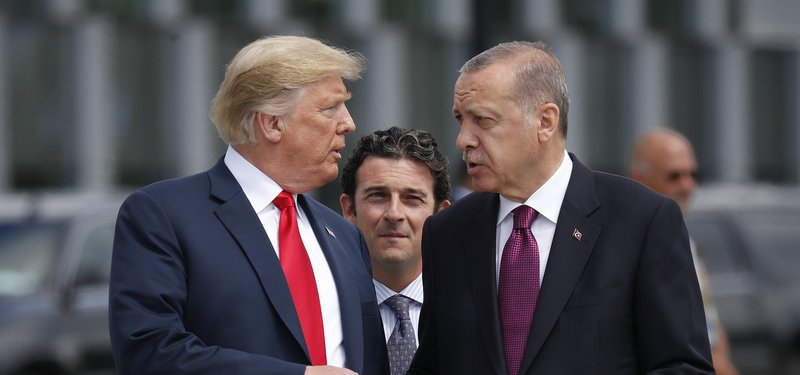
Erdoğan, Trump discuss bilateral issues, situation in Libya, Syria in phone call
President Recep Tayyip Erdoğan discussed the situation in Libya with his U.S. counterpart, President Donald Trump, in a phone call Thursday, the Turkish Presidency said less than an hour after Ankara passed a bill allowing troop deployment to Tripoli.
- Türkiye
- Compiled from wire services
- Published Date: 08:38 | 02 January 2020
- Modified Date: 10:45 | 02 January 2020
Turkish President Recep Tayyip Erdoğan discussed the situation in Libya with his U.S. counterpart, Donald Trump, in a telephone call, Turkey's Communications Directorate said Thursday.
The talk came hours after Turkish parliament voted in favor of sending troops to the northern African country.
Erdoğan said Turkey is monitoring developments "with concern and sorrow" regarding protests against the U.S. Embassy in Baghdad, and welcomed an end to incidents surrounding the foreign compound.
Thousands of Iraqis stormed the compound Tuesday protesting airstrikes Sunday in Iraq and Syria against the Kataib Hezbollah militia that killed at least 25 fighters.
The airstrikes were in response to a rocket attack Friday on a U.S. military base in Kirkuk, blamed on Kataib Hezbollah, which is part of the Iran-backed Hashd al-Shaabi group, or Popular Mobilization Forces. Friday's attack killed one U.S. contractor and wounded four U.S. service members.
The two leaders also discussed bilateral relations and the Syrian war, according to a statement by the directorate.
"Highlighting the significance of diplomacy in solving regional issues, Erdoğan and Trump agreed to boost cooperation for mutual gain in bilateral relations," said the statement.
As well, the White House issued a readout of the phone call, confirming the two leaders discussed bilateral and regional issues.
"President Trump pointed out that foreign interference is complicating the situation in Libya. The leaders agreed on the need for de-escalation in Idlib, Syria, in order to protect civilians," said White House spokesman Hogan Gidley.
On Nov. 27, Ankara and Tripoli's GNA signed two separate agreements, one on military cooperation and the other on maritime boundaries of countries in the Eastern Mediterranean.
Since the ouster of late leader Muammar Gaddafi in 2011, two seats of power have emerged in Libya: one in eastern Libya supported mainly by Egypt and the United Arab Emirates, and the GNA in the capital Tripoli, which enjoys UN and international recognition.
- TCG Anadolu to use domestic combat management system
- Turkish Coast Guard prevents 238,000 illegal migrants from crossing into Europe
- CHP mayor under fire for constructing cafe on historic cemetery in İzmir
- Armenian community experiencing most comfortable era in Turkey, new patriarch says
- Turkey change prevents 8K tons of GHG emission in 2019

